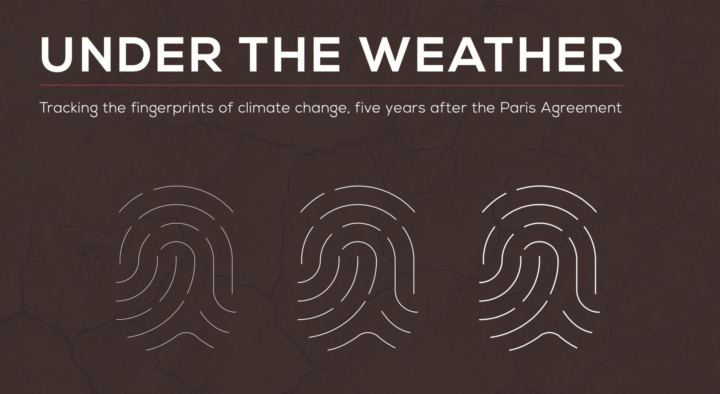Report highlights role of climate change in weather extremes
Five years after Paris Agreement, attribution studies reveal climate impacts
By George Smeeton
info@eciu.netShare
Man-made climate change is amplifying the impacts of extreme weather events such as heatwaves, drought and wildfires, a report out today concludes.

The study, Under the Weather – Tracking the Fingerprints of Climate Change, finds that nearly 80% of studies published in the five years since the conclusion of the Paris climate summit found that climate change played a role in amplifying extreme weather events, either making them more likely to occur or more damaging when they did occur. By comparison less than 10% found that climate change is making the extreme weather in question less likely or less damaging.
The report, published by the Energy and Climate Intelligence Unit (ECIU) ahead of the fifth anniversary of the Paris Agreement, identified 145 studies published in academic journals over the five years looking for a possible link from climate change to extreme weather events, of which 113 found a positive link. Although health or economic impacts are known for fewer than half of these events, the documented damage amounts to many thousands of deaths, tens of billions of dollars in economic harm, and a threat to the food supply for many millions of people.
The report’s author ECIU Director Richard Black said: “Five years ago it was common to hear people say that no specific weather event could be linked to climate change.
“Even then, that view was out of date – but now the science of climate attribution has come on leaps and bounds, and is detecting the fingerprints of climate change in many kinds of weather and in very continent.
“Governments signed the Paris Agreement largely because of the increasing influence that climate change is having on our weather, and as we come up to the anniversary of the agreement, this report serves as a timely reminder of the benefits humanity stands to gain if governments deliver on it.”
Dr Friederike Otto, Associate Director of the Environmental Change Institute, University of Oxford, highlighted the fact that currently, scientists are doing more attribution studies on events affecting developed nations than developing ones. She said: “That the links between climate change and extreme weather events are being more closely studied in developed rather than developing countries isn’t just a problem for science, providing as it does a very incomplete picture of the impacts of the changing climate across the globe.
“It also goes to the heart of United Nations efforts to tackle climate change, which have equity at their heart. Fundamentally, if links between climate change and extreme events are being ignored or overstated in the developing world, this both isn’t fair, it also means that resources cannot be used in the most efficient ways and we could easily end up adapting to yesterday’s problem if we do not assess how climate change affects people everywhere they live. We know that the poorest and least developed countries of the world are on the front line of the changing climate; climate attribution can give us a means of quantifying, and then alleviating, these impacts.”
Joanna Haigh, Emeritus Professor of Atmospheric Physics at Imperial College London, said that the report’s findings highlighted the importance of delivering the goals of the Paris Agreement: “Ongoing advances in climate science are continuing to reveal the extent of the impact of climate change on extreme weather events and how they influence the natural world which we all rely on,” she said.
“It is a reminder, if one were needed, of the importance of remaining committed to meeting climate targets so that we can slow and reduce the severity of the impacts of climate change. We cannot avoid all of these impacts, but leaders attending the Climate Ambition Summit this weekend would do well to bear in mind the vital consequences of their pledges.”
Recent analysis by Climate Action Tracker suggested that new climate pledges from China, combined with President-elect Biden’s plans for renewed US action on climate change, and other net zero announcements mean that the Paris Agreement’s 1.5˚C limit remains ‘within striking distance’.
The report, Under the Weather – Tracking the Fingerprints of Climate Change, is available here.